Cross Cultural Comparison and Challenges Faced by Burlington Industries
VerifiedAdded on 2023/06/18
|9
|2357
|461
AI Summary
This essay discusses cross cultural comparison using Hofstede theoretical framework, challenges faced by Burlington Industries while managing new teams of employees, and suggestions for overcoming challenges. It also discusses how parent company can manage international project effectively.
Contribute Materials
Your contribution can guide someone’s learning journey. Share your
documents today.

INDIVIDUAL
ESSAY
ESSAY
Secure Best Marks with AI Grader
Need help grading? Try our AI Grader for instant feedback on your assignments.
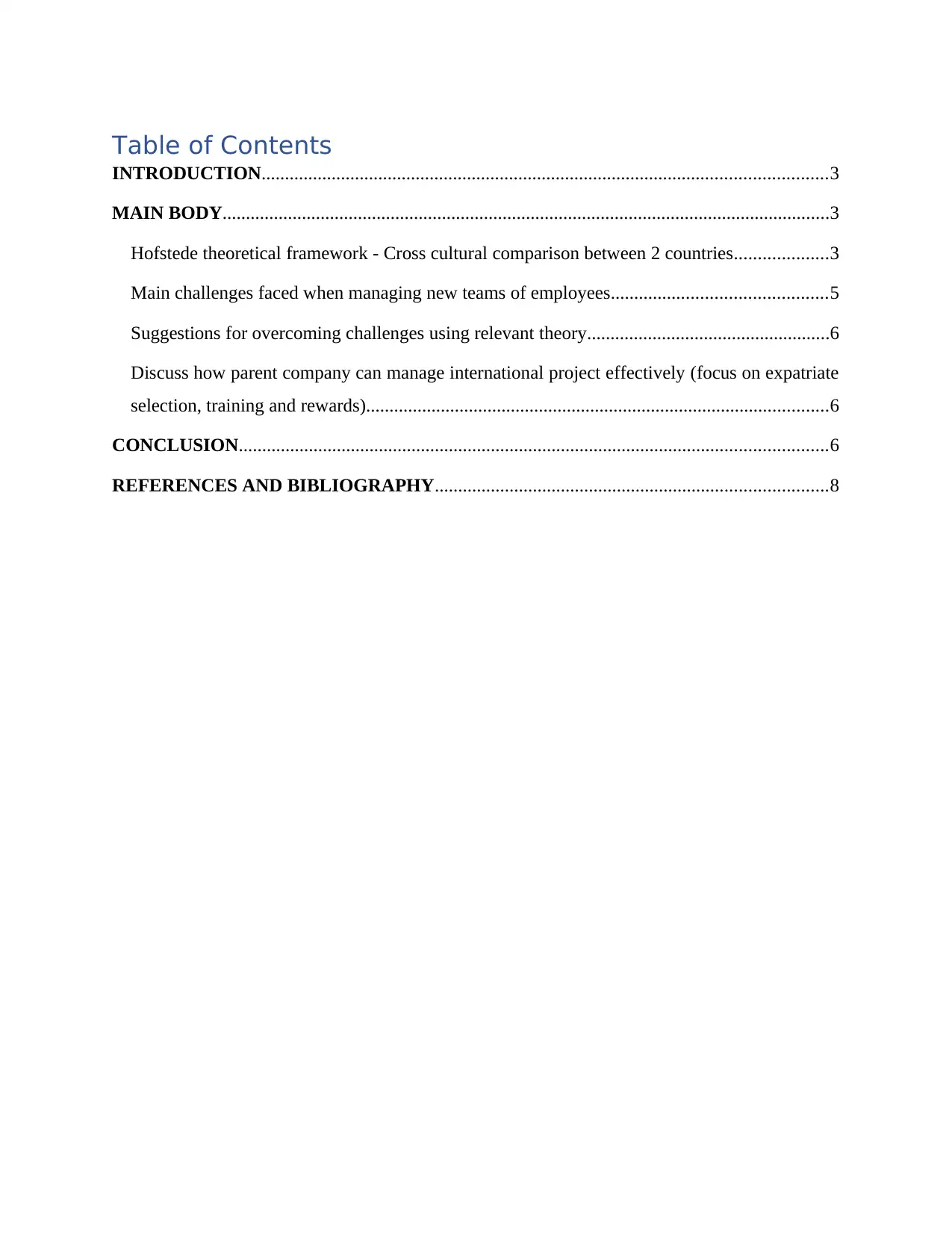
Table of Contents
INTRODUCTION.........................................................................................................................3
MAIN BODY..................................................................................................................................3
Hofstede theoretical framework - Cross cultural comparison between 2 countries....................3
Main challenges faced when managing new teams of employees..............................................5
Suggestions for overcoming challenges using relevant theory....................................................6
Discuss how parent company can manage international project effectively (focus on expatriate
selection, training and rewards)...................................................................................................6
CONCLUSION..............................................................................................................................6
REFERENCES AND BIBLIOGRAPHY....................................................................................8
INTRODUCTION.........................................................................................................................3
MAIN BODY..................................................................................................................................3
Hofstede theoretical framework - Cross cultural comparison between 2 countries....................3
Main challenges faced when managing new teams of employees..............................................5
Suggestions for overcoming challenges using relevant theory....................................................6
Discuss how parent company can manage international project effectively (focus on expatriate
selection, training and rewards)...................................................................................................6
CONCLUSION..............................................................................................................................6
REFERENCES AND BIBLIOGRAPHY....................................................................................8
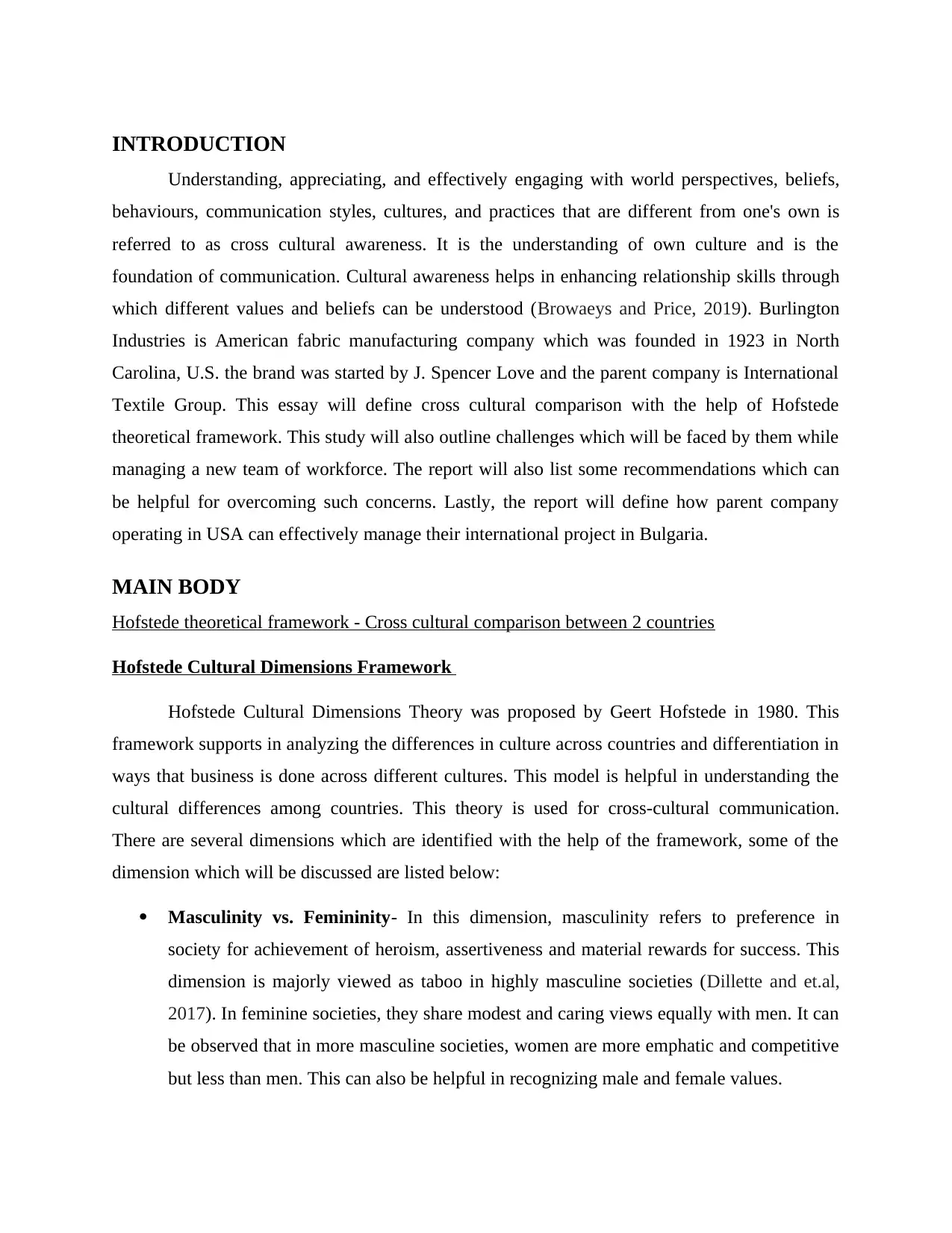
INTRODUCTION
Understanding, appreciating, and effectively engaging with world perspectives, beliefs,
behaviours, communication styles, cultures, and practices that are different from one's own is
referred to as cross cultural awareness. It is the understanding of own culture and is the
foundation of communication. Cultural awareness helps in enhancing relationship skills through
which different values and beliefs can be understood (Browaeys and Price, 2019). Burlington
Industries is American fabric manufacturing company which was founded in 1923 in North
Carolina, U.S. the brand was started by J. Spencer Love and the parent company is International
Textile Group. This essay will define cross cultural comparison with the help of Hofstede
theoretical framework. This study will also outline challenges which will be faced by them while
managing a new team of workforce. The report will also list some recommendations which can
be helpful for overcoming such concerns. Lastly, the report will define how parent company
operating in USA can effectively manage their international project in Bulgaria.
MAIN BODY
Hofstede theoretical framework - Cross cultural comparison between 2 countries
Hofstede Cultural Dimensions Framework
Hofstede Cultural Dimensions Theory was proposed by Geert Hofstede in 1980. This
framework supports in analyzing the differences in culture across countries and differentiation in
ways that business is done across different cultures. This model is helpful in understanding the
cultural differences among countries. This theory is used for cross-cultural communication.
There are several dimensions which are identified with the help of the framework, some of the
dimension which will be discussed are listed below:
Masculinity vs. Femininity- In this dimension, masculinity refers to preference in
society for achievement of heroism, assertiveness and material rewards for success. This
dimension is majorly viewed as taboo in highly masculine societies (Dillette and et.al,
2017). In feminine societies, they share modest and caring views equally with men. It can
be observed that in more masculine societies, women are more emphatic and competitive
but less than men. This can also be helpful in recognizing male and female values.
Understanding, appreciating, and effectively engaging with world perspectives, beliefs,
behaviours, communication styles, cultures, and practices that are different from one's own is
referred to as cross cultural awareness. It is the understanding of own culture and is the
foundation of communication. Cultural awareness helps in enhancing relationship skills through
which different values and beliefs can be understood (Browaeys and Price, 2019). Burlington
Industries is American fabric manufacturing company which was founded in 1923 in North
Carolina, U.S. the brand was started by J. Spencer Love and the parent company is International
Textile Group. This essay will define cross cultural comparison with the help of Hofstede
theoretical framework. This study will also outline challenges which will be faced by them while
managing a new team of workforce. The report will also list some recommendations which can
be helpful for overcoming such concerns. Lastly, the report will define how parent company
operating in USA can effectively manage their international project in Bulgaria.
MAIN BODY
Hofstede theoretical framework - Cross cultural comparison between 2 countries
Hofstede Cultural Dimensions Framework
Hofstede Cultural Dimensions Theory was proposed by Geert Hofstede in 1980. This
framework supports in analyzing the differences in culture across countries and differentiation in
ways that business is done across different cultures. This model is helpful in understanding the
cultural differences among countries. This theory is used for cross-cultural communication.
There are several dimensions which are identified with the help of the framework, some of the
dimension which will be discussed are listed below:
Masculinity vs. Femininity- In this dimension, masculinity refers to preference in
society for achievement of heroism, assertiveness and material rewards for success. This
dimension is majorly viewed as taboo in highly masculine societies (Dillette and et.al,
2017). In feminine societies, they share modest and caring views equally with men. It can
be observed that in more masculine societies, women are more emphatic and competitive
but less than men. This can also be helpful in recognizing male and female values.
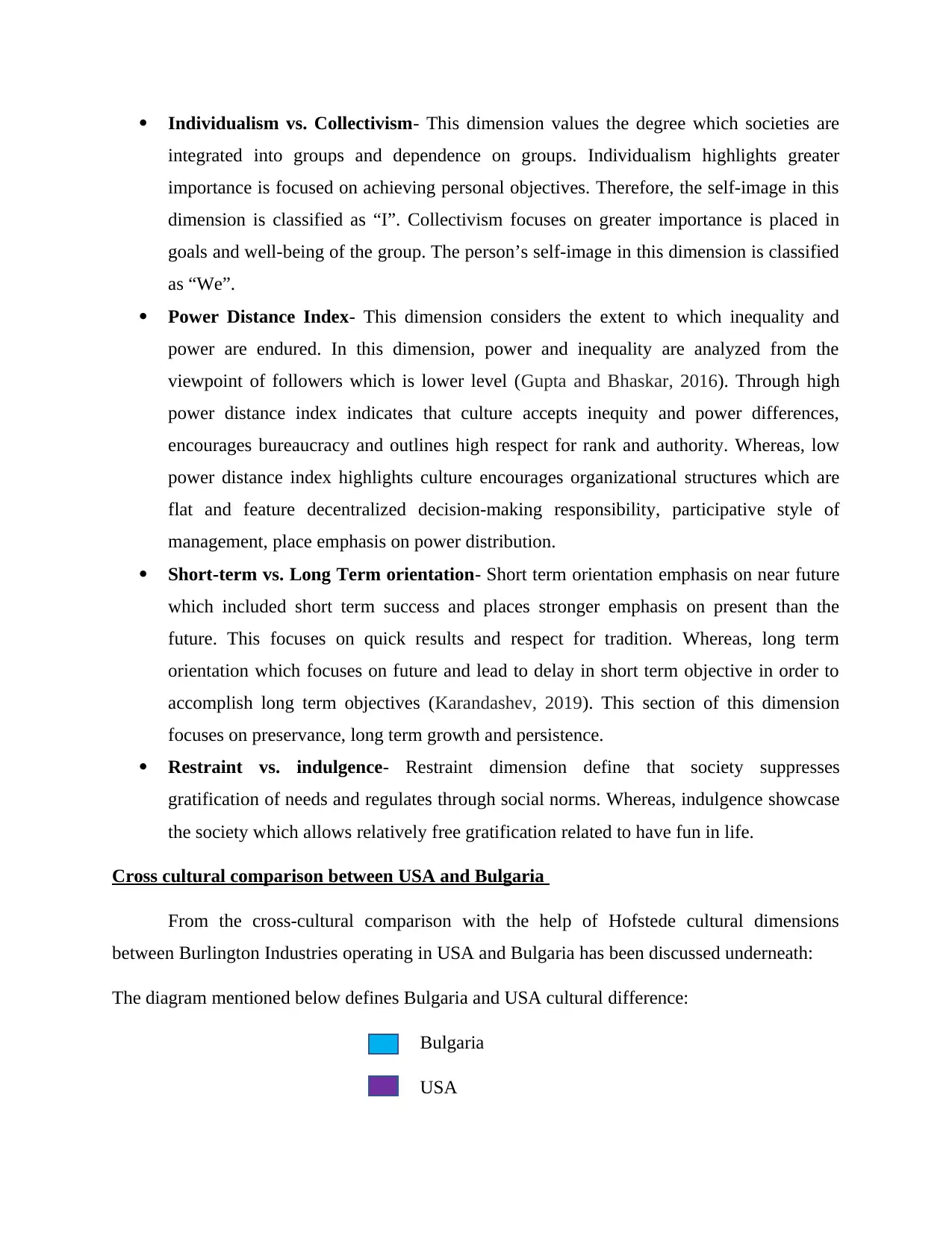
Individualism vs. Collectivism- This dimension values the degree which societies are
integrated into groups and dependence on groups. Individualism highlights greater
importance is focused on achieving personal objectives. Therefore, the self-image in this
dimension is classified as “I”. Collectivism focuses on greater importance is placed in
goals and well-being of the group. The person’s self-image in this dimension is classified
as “We”.
Power Distance Index- This dimension considers the extent to which inequality and
power are endured. In this dimension, power and inequality are analyzed from the
viewpoint of followers which is lower level (Gupta and Bhaskar, 2016). Through high
power distance index indicates that culture accepts inequity and power differences,
encourages bureaucracy and outlines high respect for rank and authority. Whereas, low
power distance index highlights culture encourages organizational structures which are
flat and feature decentralized decision-making responsibility, participative style of
management, place emphasis on power distribution.
Short-term vs. Long Term orientation- Short term orientation emphasis on near future
which included short term success and places stronger emphasis on present than the
future. This focuses on quick results and respect for tradition. Whereas, long term
orientation which focuses on future and lead to delay in short term objective in order to
accomplish long term objectives (Karandashev, 2019). This section of this dimension
focuses on preservance, long term growth and persistence.
Restraint vs. indulgence- Restraint dimension define that society suppresses
gratification of needs and regulates through social norms. Whereas, indulgence showcase
the society which allows relatively free gratification related to have fun in life.
Cross cultural comparison between USA and Bulgaria
From the cross-cultural comparison with the help of Hofstede cultural dimensions
between Burlington Industries operating in USA and Bulgaria has been discussed underneath:
The diagram mentioned below defines Bulgaria and USA cultural difference:
Bulgaria
USA
integrated into groups and dependence on groups. Individualism highlights greater
importance is focused on achieving personal objectives. Therefore, the self-image in this
dimension is classified as “I”. Collectivism focuses on greater importance is placed in
goals and well-being of the group. The person’s self-image in this dimension is classified
as “We”.
Power Distance Index- This dimension considers the extent to which inequality and
power are endured. In this dimension, power and inequality are analyzed from the
viewpoint of followers which is lower level (Gupta and Bhaskar, 2016). Through high
power distance index indicates that culture accepts inequity and power differences,
encourages bureaucracy and outlines high respect for rank and authority. Whereas, low
power distance index highlights culture encourages organizational structures which are
flat and feature decentralized decision-making responsibility, participative style of
management, place emphasis on power distribution.
Short-term vs. Long Term orientation- Short term orientation emphasis on near future
which included short term success and places stronger emphasis on present than the
future. This focuses on quick results and respect for tradition. Whereas, long term
orientation which focuses on future and lead to delay in short term objective in order to
accomplish long term objectives (Karandashev, 2019). This section of this dimension
focuses on preservance, long term growth and persistence.
Restraint vs. indulgence- Restraint dimension define that society suppresses
gratification of needs and regulates through social norms. Whereas, indulgence showcase
the society which allows relatively free gratification related to have fun in life.
Cross cultural comparison between USA and Bulgaria
From the cross-cultural comparison with the help of Hofstede cultural dimensions
between Burlington Industries operating in USA and Bulgaria has been discussed underneath:
The diagram mentioned below defines Bulgaria and USA cultural difference:
Bulgaria
USA
Secure Best Marks with AI Grader
Need help grading? Try our AI Grader for instant feedback on your assignments.
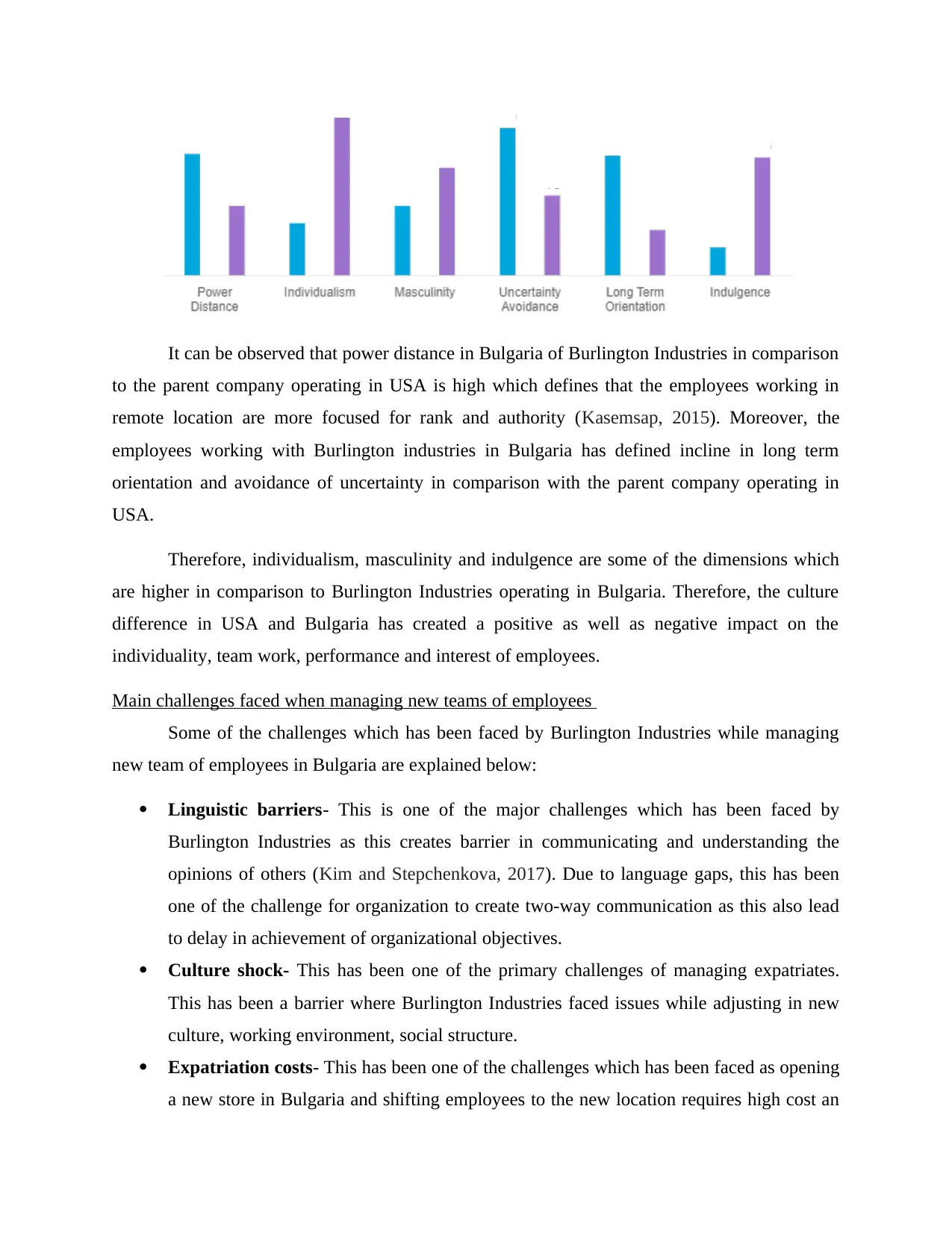
It can be observed that power distance in Bulgaria of Burlington Industries in comparison
to the parent company operating in USA is high which defines that the employees working in
remote location are more focused for rank and authority (Kasemsap, 2015). Moreover, the
employees working with Burlington industries in Bulgaria has defined incline in long term
orientation and avoidance of uncertainty in comparison with the parent company operating in
USA.
Therefore, individualism, masculinity and indulgence are some of the dimensions which
are higher in comparison to Burlington Industries operating in Bulgaria. Therefore, the culture
difference in USA and Bulgaria has created a positive as well as negative impact on the
individuality, team work, performance and interest of employees.
Main challenges faced when managing new teams of employees
Some of the challenges which has been faced by Burlington Industries while managing
new team of employees in Bulgaria are explained below:
Linguistic barriers- This is one of the major challenges which has been faced by
Burlington Industries as this creates barrier in communicating and understanding the
opinions of others (Kim and Stepchenkova, 2017). Due to language gaps, this has been
one of the challenge for organization to create two-way communication as this also lead
to delay in achievement of organizational objectives.
Culture shock- This has been one of the primary challenges of managing expatriates.
This has been a barrier where Burlington Industries faced issues while adjusting in new
culture, working environment, social structure.
Expatriation costs- This has been one of the challenges which has been faced as opening
a new store in Bulgaria and shifting employees to the new location requires high cost an
to the parent company operating in USA is high which defines that the employees working in
remote location are more focused for rank and authority (Kasemsap, 2015). Moreover, the
employees working with Burlington industries in Bulgaria has defined incline in long term
orientation and avoidance of uncertainty in comparison with the parent company operating in
USA.
Therefore, individualism, masculinity and indulgence are some of the dimensions which
are higher in comparison to Burlington Industries operating in Bulgaria. Therefore, the culture
difference in USA and Bulgaria has created a positive as well as negative impact on the
individuality, team work, performance and interest of employees.
Main challenges faced when managing new teams of employees
Some of the challenges which has been faced by Burlington Industries while managing
new team of employees in Bulgaria are explained below:
Linguistic barriers- This is one of the major challenges which has been faced by
Burlington Industries as this creates barrier in communicating and understanding the
opinions of others (Kim and Stepchenkova, 2017). Due to language gaps, this has been
one of the challenge for organization to create two-way communication as this also lead
to delay in achievement of organizational objectives.
Culture shock- This has been one of the primary challenges of managing expatriates.
This has been a barrier where Burlington Industries faced issues while adjusting in new
culture, working environment, social structure.
Expatriation costs- This has been one of the challenges which has been faced as opening
a new store in Bulgaria and shifting employees to the new location requires high cost an
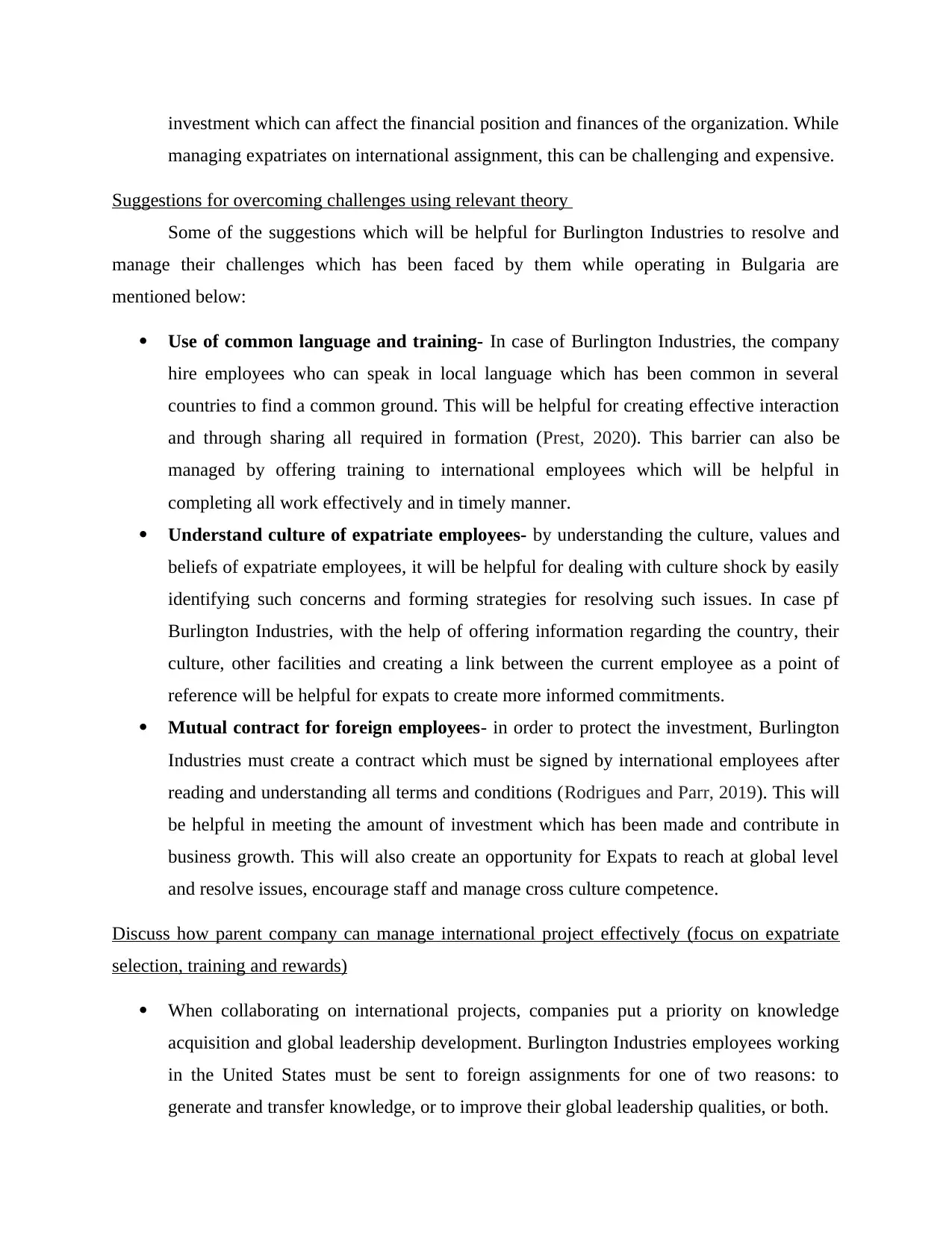
investment which can affect the financial position and finances of the organization. While
managing expatriates on international assignment, this can be challenging and expensive.
Suggestions for overcoming challenges using relevant theory
Some of the suggestions which will be helpful for Burlington Industries to resolve and
manage their challenges which has been faced by them while operating in Bulgaria are
mentioned below:
Use of common language and training- In case of Burlington Industries, the company
hire employees who can speak in local language which has been common in several
countries to find a common ground. This will be helpful for creating effective interaction
and through sharing all required in formation (Prest, 2020). This barrier can also be
managed by offering training to international employees which will be helpful in
completing all work effectively and in timely manner.
Understand culture of expatriate employees- by understanding the culture, values and
beliefs of expatriate employees, it will be helpful for dealing with culture shock by easily
identifying such concerns and forming strategies for resolving such issues. In case pf
Burlington Industries, with the help of offering information regarding the country, their
culture, other facilities and creating a link between the current employee as a point of
reference will be helpful for expats to create more informed commitments.
Mutual contract for foreign employees- in order to protect the investment, Burlington
Industries must create a contract which must be signed by international employees after
reading and understanding all terms and conditions (Rodrigues and Parr, 2019). This will
be helpful in meeting the amount of investment which has been made and contribute in
business growth. This will also create an opportunity for Expats to reach at global level
and resolve issues, encourage staff and manage cross culture competence.
Discuss how parent company can manage international project effectively (focus on expatriate
selection, training and rewards)
When collaborating on international projects, companies put a priority on knowledge
acquisition and global leadership development. Burlington Industries employees working
in the United States must be sent to foreign assignments for one of two reasons: to
generate and transfer knowledge, or to improve their global leadership qualities, or both.
managing expatriates on international assignment, this can be challenging and expensive.
Suggestions for overcoming challenges using relevant theory
Some of the suggestions which will be helpful for Burlington Industries to resolve and
manage their challenges which has been faced by them while operating in Bulgaria are
mentioned below:
Use of common language and training- In case of Burlington Industries, the company
hire employees who can speak in local language which has been common in several
countries to find a common ground. This will be helpful for creating effective interaction
and through sharing all required in formation (Prest, 2020). This barrier can also be
managed by offering training to international employees which will be helpful in
completing all work effectively and in timely manner.
Understand culture of expatriate employees- by understanding the culture, values and
beliefs of expatriate employees, it will be helpful for dealing with culture shock by easily
identifying such concerns and forming strategies for resolving such issues. In case pf
Burlington Industries, with the help of offering information regarding the country, their
culture, other facilities and creating a link between the current employee as a point of
reference will be helpful for expats to create more informed commitments.
Mutual contract for foreign employees- in order to protect the investment, Burlington
Industries must create a contract which must be signed by international employees after
reading and understanding all terms and conditions (Rodrigues and Parr, 2019). This will
be helpful in meeting the amount of investment which has been made and contribute in
business growth. This will also create an opportunity for Expats to reach at global level
and resolve issues, encourage staff and manage cross culture competence.
Discuss how parent company can manage international project effectively (focus on expatriate
selection, training and rewards)
When collaborating on international projects, companies put a priority on knowledge
acquisition and global leadership development. Burlington Industries employees working
in the United States must be sent to foreign assignments for one of two reasons: to
generate and transfer knowledge, or to improve their global leadership qualities, or both.
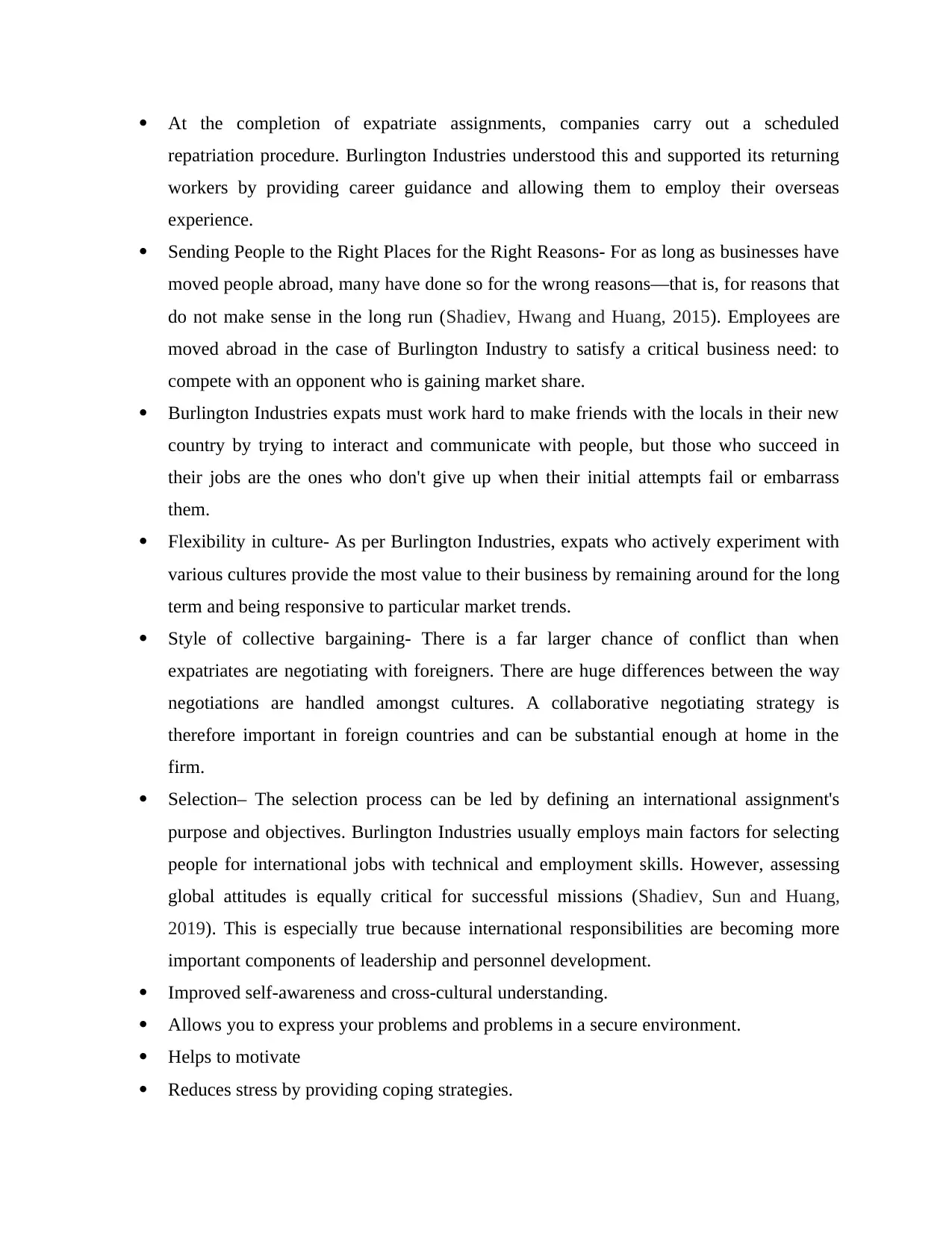
At the completion of expatriate assignments, companies carry out a scheduled
repatriation procedure. Burlington Industries understood this and supported its returning
workers by providing career guidance and allowing them to employ their overseas
experience.
Sending People to the Right Places for the Right Reasons- For as long as businesses have
moved people abroad, many have done so for the wrong reasons—that is, for reasons that
do not make sense in the long run (Shadiev, Hwang and Huang, 2015). Employees are
moved abroad in the case of Burlington Industry to satisfy a critical business need: to
compete with an opponent who is gaining market share.
Burlington Industries expats must work hard to make friends with the locals in their new
country by trying to interact and communicate with people, but those who succeed in
their jobs are the ones who don't give up when their initial attempts fail or embarrass
them.
Flexibility in culture- As per Burlington Industries, expats who actively experiment with
various cultures provide the most value to their business by remaining around for the long
term and being responsive to particular market trends.
Style of collective bargaining- There is a far larger chance of conflict than when
expatriates are negotiating with foreigners. There are huge differences between the way
negotiations are handled amongst cultures. A collaborative negotiating strategy is
therefore important in foreign countries and can be substantial enough at home in the
firm.
Selection– The selection process can be led by defining an international assignment's
purpose and objectives. Burlington Industries usually employs main factors for selecting
people for international jobs with technical and employment skills. However, assessing
global attitudes is equally critical for successful missions (Shadiev, Sun and Huang,
2019). This is especially true because international responsibilities are becoming more
important components of leadership and personnel development.
Improved self-awareness and cross-cultural understanding.
Allows you to express your problems and problems in a secure environment.
Helps to motivate
Reduces stress by providing coping strategies.
repatriation procedure. Burlington Industries understood this and supported its returning
workers by providing career guidance and allowing them to employ their overseas
experience.
Sending People to the Right Places for the Right Reasons- For as long as businesses have
moved people abroad, many have done so for the wrong reasons—that is, for reasons that
do not make sense in the long run (Shadiev, Hwang and Huang, 2015). Employees are
moved abroad in the case of Burlington Industry to satisfy a critical business need: to
compete with an opponent who is gaining market share.
Burlington Industries expats must work hard to make friends with the locals in their new
country by trying to interact and communicate with people, but those who succeed in
their jobs are the ones who don't give up when their initial attempts fail or embarrass
them.
Flexibility in culture- As per Burlington Industries, expats who actively experiment with
various cultures provide the most value to their business by remaining around for the long
term and being responsive to particular market trends.
Style of collective bargaining- There is a far larger chance of conflict than when
expatriates are negotiating with foreigners. There are huge differences between the way
negotiations are handled amongst cultures. A collaborative negotiating strategy is
therefore important in foreign countries and can be substantial enough at home in the
firm.
Selection– The selection process can be led by defining an international assignment's
purpose and objectives. Burlington Industries usually employs main factors for selecting
people for international jobs with technical and employment skills. However, assessing
global attitudes is equally critical for successful missions (Shadiev, Sun and Huang,
2019). This is especially true because international responsibilities are becoming more
important components of leadership and personnel development.
Improved self-awareness and cross-cultural understanding.
Allows you to express your problems and problems in a secure environment.
Helps to motivate
Reduces stress by providing coping strategies.
Paraphrase This Document
Need a fresh take? Get an instant paraphrase of this document with our AI Paraphraser
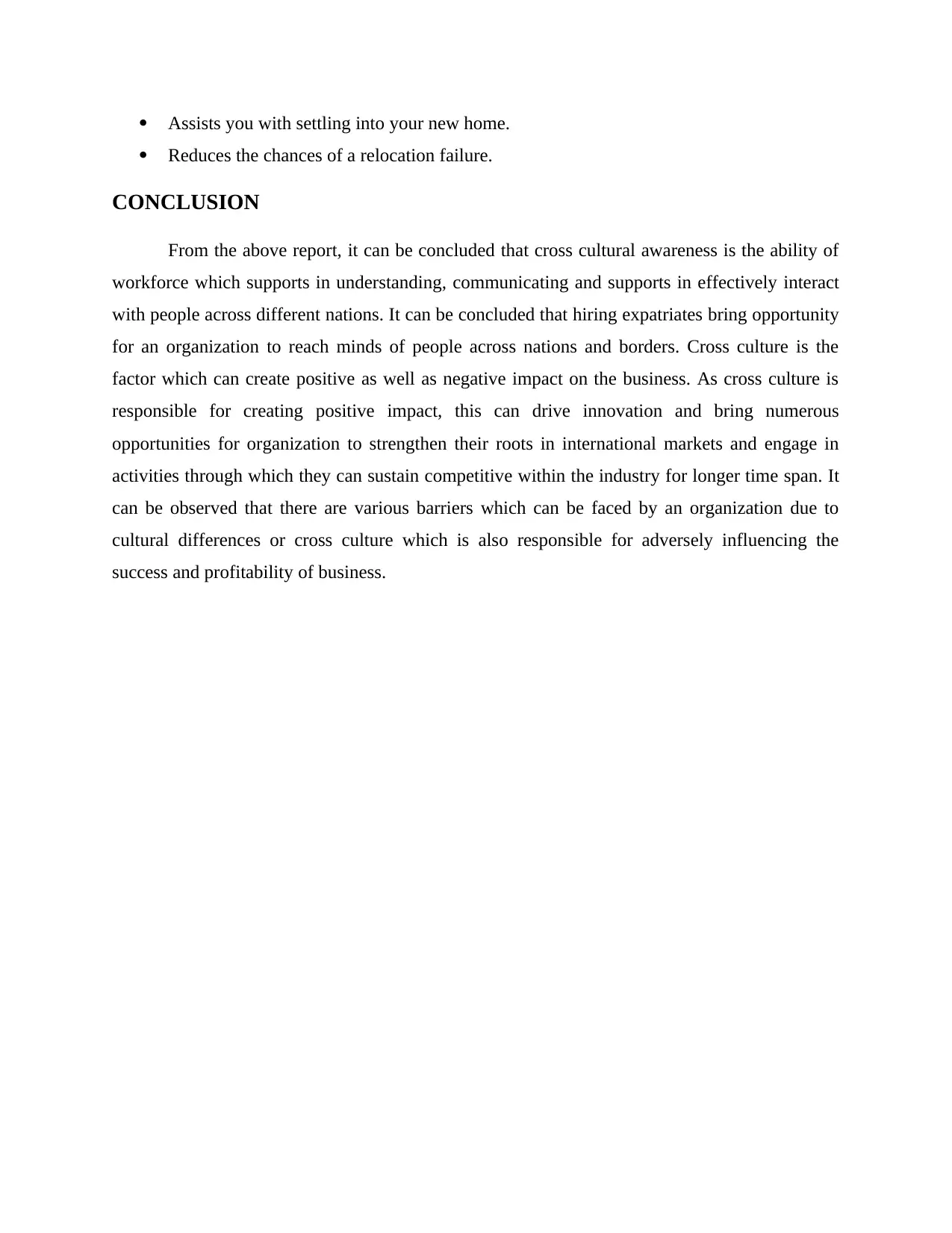
Assists you with settling into your new home.
Reduces the chances of a relocation failure.
CONCLUSION
From the above report, it can be concluded that cross cultural awareness is the ability of
workforce which supports in understanding, communicating and supports in effectively interact
with people across different nations. It can be concluded that hiring expatriates bring opportunity
for an organization to reach minds of people across nations and borders. Cross culture is the
factor which can create positive as well as negative impact on the business. As cross culture is
responsible for creating positive impact, this can drive innovation and bring numerous
opportunities for organization to strengthen their roots in international markets and engage in
activities through which they can sustain competitive within the industry for longer time span. It
can be observed that there are various barriers which can be faced by an organization due to
cultural differences or cross culture which is also responsible for adversely influencing the
success and profitability of business.
Reduces the chances of a relocation failure.
CONCLUSION
From the above report, it can be concluded that cross cultural awareness is the ability of
workforce which supports in understanding, communicating and supports in effectively interact
with people across different nations. It can be concluded that hiring expatriates bring opportunity
for an organization to reach minds of people across nations and borders. Cross culture is the
factor which can create positive as well as negative impact on the business. As cross culture is
responsible for creating positive impact, this can drive innovation and bring numerous
opportunities for organization to strengthen their roots in international markets and engage in
activities through which they can sustain competitive within the industry for longer time span. It
can be observed that there are various barriers which can be faced by an organization due to
cultural differences or cross culture which is also responsible for adversely influencing the
success and profitability of business.
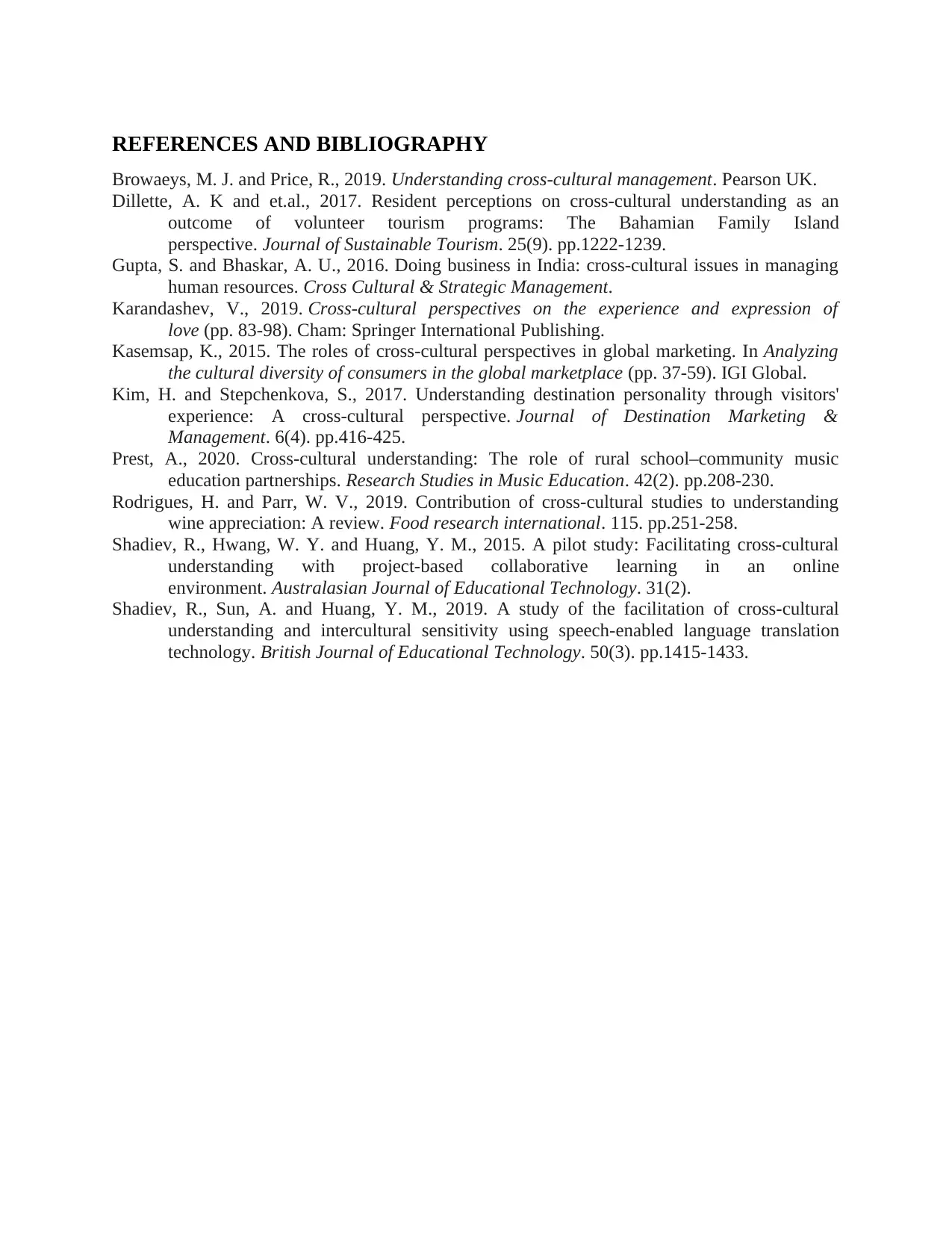
REFERENCES AND BIBLIOGRAPHY
Browaeys, M. J. and Price, R., 2019. Understanding cross-cultural management. Pearson UK.
Dillette, A. K and et.al., 2017. Resident perceptions on cross-cultural understanding as an
outcome of volunteer tourism programs: The Bahamian Family Island
perspective. Journal of Sustainable Tourism. 25(9). pp.1222-1239.
Gupta, S. and Bhaskar, A. U., 2016. Doing business in India: cross-cultural issues in managing
human resources. Cross Cultural & Strategic Management.
Karandashev, V., 2019. Cross-cultural perspectives on the experience and expression of
love (pp. 83-98). Cham: Springer International Publishing.
Kasemsap, K., 2015. The roles of cross-cultural perspectives in global marketing. In Analyzing
the cultural diversity of consumers in the global marketplace (pp. 37-59). IGI Global.
Kim, H. and Stepchenkova, S., 2017. Understanding destination personality through visitors'
experience: A cross-cultural perspective. Journal of Destination Marketing &
Management. 6(4). pp.416-425.
Prest, A., 2020. Cross-cultural understanding: The role of rural school–community music
education partnerships. Research Studies in Music Education. 42(2). pp.208-230.
Rodrigues, H. and Parr, W. V., 2019. Contribution of cross-cultural studies to understanding
wine appreciation: A review. Food research international. 115. pp.251-258.
Shadiev, R., Hwang, W. Y. and Huang, Y. M., 2015. A pilot study: Facilitating cross-cultural
understanding with project-based collaborative learning in an online
environment. Australasian Journal of Educational Technology. 31(2).
Shadiev, R., Sun, A. and Huang, Y. M., 2019. A study of the facilitation of cross‐cultural
understanding and intercultural sensitivity using speech‐enabled language translation
technology. British Journal of Educational Technology. 50(3). pp.1415-1433.
Browaeys, M. J. and Price, R., 2019. Understanding cross-cultural management. Pearson UK.
Dillette, A. K and et.al., 2017. Resident perceptions on cross-cultural understanding as an
outcome of volunteer tourism programs: The Bahamian Family Island
perspective. Journal of Sustainable Tourism. 25(9). pp.1222-1239.
Gupta, S. and Bhaskar, A. U., 2016. Doing business in India: cross-cultural issues in managing
human resources. Cross Cultural & Strategic Management.
Karandashev, V., 2019. Cross-cultural perspectives on the experience and expression of
love (pp. 83-98). Cham: Springer International Publishing.
Kasemsap, K., 2015. The roles of cross-cultural perspectives in global marketing. In Analyzing
the cultural diversity of consumers in the global marketplace (pp. 37-59). IGI Global.
Kim, H. and Stepchenkova, S., 2017. Understanding destination personality through visitors'
experience: A cross-cultural perspective. Journal of Destination Marketing &
Management. 6(4). pp.416-425.
Prest, A., 2020. Cross-cultural understanding: The role of rural school–community music
education partnerships. Research Studies in Music Education. 42(2). pp.208-230.
Rodrigues, H. and Parr, W. V., 2019. Contribution of cross-cultural studies to understanding
wine appreciation: A review. Food research international. 115. pp.251-258.
Shadiev, R., Hwang, W. Y. and Huang, Y. M., 2015. A pilot study: Facilitating cross-cultural
understanding with project-based collaborative learning in an online
environment. Australasian Journal of Educational Technology. 31(2).
Shadiev, R., Sun, A. and Huang, Y. M., 2019. A study of the facilitation of cross‐cultural
understanding and intercultural sensitivity using speech‐enabled language translation
technology. British Journal of Educational Technology. 50(3). pp.1415-1433.
1 out of 9
Related Documents
Your All-in-One AI-Powered Toolkit for Academic Success.
+13062052269
info@desklib.com
Available 24*7 on WhatsApp / Email
![[object Object]](/_next/static/media/star-bottom.7253800d.svg)
Unlock your academic potential
© 2024 | Zucol Services PVT LTD | All rights reserved.





